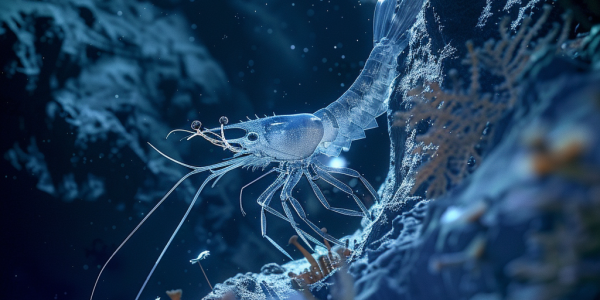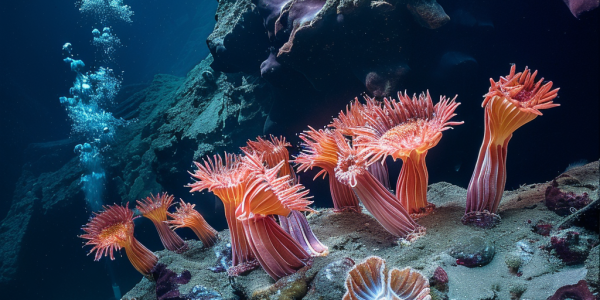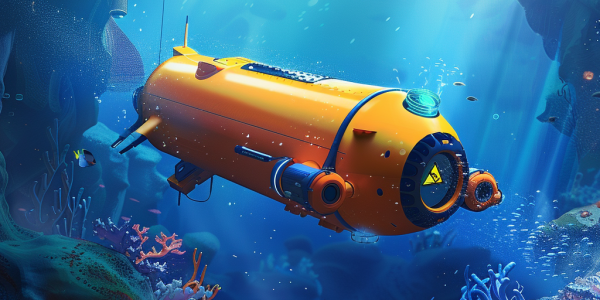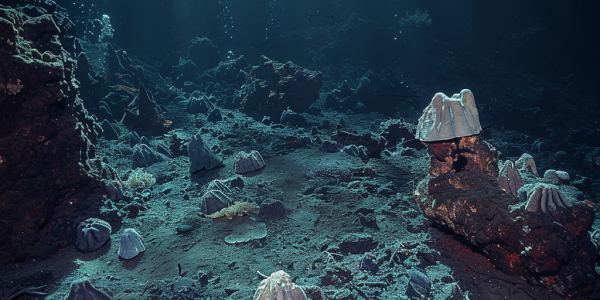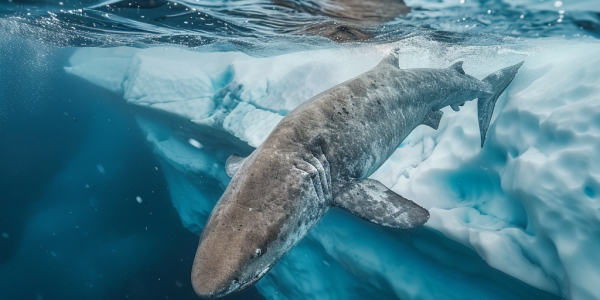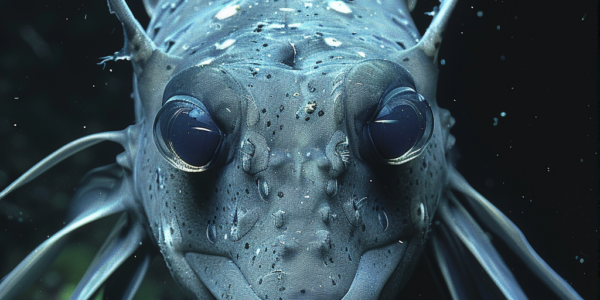New Predatory Amphipod Species Discovered in Atacama Trench
Scientists have discovered a new species of large predatory amphipod, Dulcibella camanchaca, at a depth of 25,900 feet in the Atacama Trench. This shrimp-like creature is notable for being the first known large predator in the extreme depths of the ocean, showcasing the rich biodiversity and ecological complexities of hadal zones. The discovery, made during the 2023 IDOOS Expedition, enhances our understanding of deep-sea ecosystems and the adaptations of life in harsh environments.
Scientists Discover New Ecosystem in Earth’s Oceanic Crust
Scientists from the Schmidt Ocean Institute have discovered a new ecosystem in the Earth’s oceanic crust, revealing giant tubeworms and unique marine life thriving in extreme conditions. This groundbreaking research challenges previous understandings of marine biodiversity and highlights the importance of ocean exploration and conservation.
Exploring the Resilience of Tubeworms in Deep-Sea Ecosystems
Discover the fascinating world of tubeworms, extraordinary invertebrates thriving in extreme deep-sea environments near hydrothermal vents and cold seeps. Learn about their unique adaptations, symbiotic relationships with chemosynthetic bacteria, and the critical research efforts by the Bureau of Ocean Energy Management (BOEM) aimed at protecting these vital ecosystems from the impacts of climate change and human activity.
Scientists Embark on Deep-Sea Expedition to Uncover Marine Biodiversity
Scientists from the Senckenberg Research Institute embark on a groundbreaking expedition aboard the research vessel ‘Meteor’ to explore the depths of the Atlantic Ocean. This mission aims to uncover new marine species and enhance our understanding of biodiversity, crucial for addressing environmental challenges and climate change. With a focus on the role of biodiversity in Earth’s systems, the Senckenberg Society continues its commitment to scientific inquiry and conservation efforts.
China Develops First Autonomous Underwater Vehicle for Deep-Sea Microbial Sampling
Tianjin University has unveiled China’s first autonomous underwater vehicle (AUV) for deep-sea microbial sampling, revolutionizing marine research. This innovative AUV, tested in the South China Sea, enhances data collection efficiency and preserves microbial genes, crucial for studying ocean biodiversity. With potential implications for ecological balance and resource discovery, this advancement positions China at the forefront of marine biology. Explore how this technology could reshape our understanding of deep-sea ecosystems and contribute to environmental conservation.
Groundbreaking Discovery: ‘Dark Oxygen’ Generated by Metallic Nodules in Pacific Ocean
Researchers have discovered a groundbreaking phenomenon in the Pacific Ocean, where polymetallic nodules generate oxygen in total darkness, challenging traditional beliefs about life on Earth. This study highlights the ecological implications of mining in the Clarion-Clipperton Zone, emphasizing the need for careful environmental consideration as valuable resources are extracted from the ocean floor.
Discovery of 392-Year-Old Greenland Shark Reveals Deep Sea Mysteries
Scientists have identified a 392-year-old Greenland shark in the Arctic Ocean, shedding light on the remarkable longevity of these mysterious creatures. Through radiocarbon dating, researchers have unraveled the secrets of this ancient species, offering valuable insights into marine ecosystems and the evolution of our planet. This groundbreaking discovery underscores the importance of conservation efforts to protect fragile Arctic ecosystems and ensure the survival of resilient species in a changing world.
New Species of Deep-Sea Chimaera Discovered off the Coast of Thailand
A new species of deep-sea chimaera with a ghoulish appearance, Chimaera supapae, has been discovered in the Andaman Sea off the coast of Thailand. This elusive deep-sea creature has a massive head, giant, iridescent eyes and feathery fins. Chimaera supapae is a cartilaginous fish in the order of the oldest fishes alive today, Chimaeriformes, and is a distant relative of sharks and rays. The discovery brings the total known species of chimaera to 54 and these ghostly figures are found at depths below 1,640 feet (500 meters) in the dark waters of the deep-sea, where they feed on bottom-dwelling animals such as crustaceans, mollusks and worms.
Mars influencing Earth’s deep oceans with ‘giant whirlpools,’ scientists say
New research suggests that Mars may be influencing deep ocean currents on Earth, leading to the formation of ‘giant whirlpools.’ Scientists analyzed sediments to look back tens of millions of years into Earth’s past, revealing 2.4 million-year climate cycles linked to the interactions of Mars and Earth orbiting the Sun. This phenomenon, known as ‘resonance,’ affects the shape of their orbits and translates to periods of increased solar energy and warmer climate on Earth, correlating with more vigorous ocean currents. However, these natural climate cycles are not linked to the rapid heating the world is experiencing today due to human activities. The study’s findings provide valuable insights into the forces driving deep ocean currents and their impact on the Earth’s climate.

